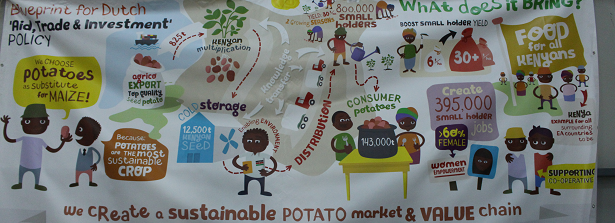The first multiplication site for seed potato varieties from the Netherlands

Kenyan farmers, multipliers and processors are very enthusiastic about Dutch potato varieties. The challenge is to effectively multiply them, in the context of strategic potato sector development. This article summarizes the findings of a visit to a seed potato multiplication farm and storage facility of Agrico (International Potato Cooperative).
A group of Food Security Advisors and Agricultural Counselors from 12 Dutch embassies across Africa, Asia and the Netherlands visited Kenya from June 12 to 15, 2017. This ‘learning journey’ was meant to jointly learn and reflect on results, successes and failures from implementing the Food and Nutrition Security (FNS) policy in the context of the aid and trade agenda. They visited selected projects implemented with support from the Dutch government. This article summarises the findings from the fourth field visit.
Agrico’s farm and factory
The learning journey participants visited a seed potato multiplication farm and storage facility of Agrico (International Potato Cooperative). On the farm, there were tractors digging the trenches ready to plant the seed potatoes imported from the Netherlands. Willem Dolleman of Agrico explained that the farm was the first multiplication site for seed potato varieties from the Netherlands, the second of which is now in Kitale. Agrico shares the farm with a wheat farmer as part of ensuring crop rotation.
Enabling environment
Dolleman highlighted that among the key concerns for seed potato multiplication the lack of enabling environment. In Kenya, there are currently 33 seed varieties registered, compared to the 400 seed varieties registered in the Netherlands. There is a lot of interest on the part of smallholder farmers, multipliers and processors for seeds from the Netherlands. The Kenyan government does not allow for the importation of consumption potatoes. Instead, they must be multiplied in Kenya before they can be grown for consumption. There was a recent misunderstanding regarding the requirements for Erwinia, a bacteria affecting potatoes. Whereas in the Netherlands it is generally understood there is a zero tolerance for Erwinia, which means a visual zero during field inspection and a visual zero at the export inspection; KEPHIS (the Kenyan Government regulatory body) did a lab inspection where Erwinia was found and wanted to destroy 2,000 tonnes of seed potatoes.
Knowledge transfer
Dolleman expressed that few farmers have prerequisite knowledge on how to grow seed potatoes and how to deal with diseases and pests. Potato farming in Kenya is also largely non-mechanized. Few farmers that want to increase production utilize a small planter. A majority of these farmers are those that participate in demo sites and implement the lessons to increase their yields.
At the store, the visitors found a group of women sorting and grading the potato seeds ready for multiplication and storage. One of the supervisors explained that the storage boxes were made of soft wood from Poland which were lighter than the hard wood available in Kenya. He also explained that most of the potato seeds had grown shoots as they have delayed to be planted while waiting for an approval from KEPHIS, which could take about two to four weeks.
IFDC who are spreading the potato seeds to the smallholder farmers, and Charvi Investments Ltd. who are opening new markets for potato growers were also at the store. IFDC is a consortium member of the 2Scale Program which focuses on competitive agricultural systems. They explained that local varieties such as Asante have an advantage over the imported varieties in that they do not germinate easily, hence why a farmer in Meru is able to export to Somalia in good condition. Some discussion followed on whether or not local varieties could be cross-bred with imported varieties. Agrico is involved in some tests with such new varieties. They are the only ones testing this around the equator zone for now
Partnerships
EKN Kenya and KEPHIS are in communication regarding the import requirements and support in plant protection services. The agreements will mutually benefit both countries in that the release of Dutch varieties has brought many investments to Kenya in the form of machines, storage and processing facilities by both Dutch and local companies.
Further reading






I have been watching and reading about you and the company in Kenya. The breeding potatoes is very good for farmers in the local communities.
The company well established and I love to learn from you and the company.
I would be very glad to establish my small potatoes farm in Ghana to help out growers farmers in the local communities in potatoes farming as business.
I hope to hear from you soon.
My regards.